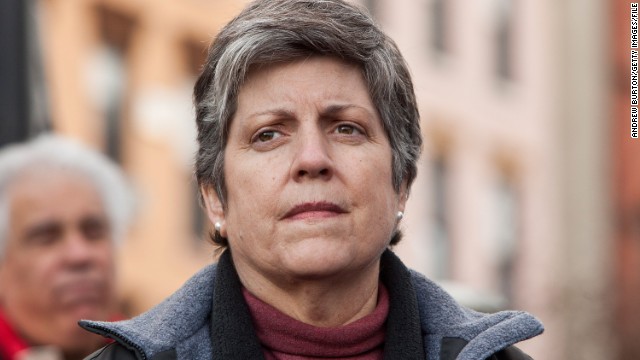Results 1 to 1 of 1
Thread Information
Users Browsing this Thread
There are currently 1 users browsing this thread. (0 members and 1 guests)
-
07-12-2013, 11:51 PM #1
Napolitano stumbled on immigration
By Edward Alden, Special to CNN
updated 4:38 PM EDT, Fri July 12, 2013

Homeland Security Secretary Janet Napolitano will leave her post to become president of the University of California system.
Editor's note: Edward Alden is a senior fellow at the Council on Foreign Relations and was the project director for the 2009 Independent Task Force on U.S. Immigration Policy, co-chaired by former Florida Gov. Jeb Bush and Mack McLarty, former White House chief of staff for President Bill Clinton.
(CNN) -- There is no reason to believe Friday's resignation announcement by Homeland Security Secretary Janet Napolitano is anything other than her jumping at a better job offer -- the chance to be the next president of the University of California system.
But the surprise move may also suggest that President Barack Obama believes immigration reform -- which could be the signature legislative accomplishment of his second term -- faces a better chance in the Republican House of Representatives with someone else in charge at the Department of Homeland Security. The president should move quickly to name a replacement with stronger credibility on both sides of the aisle who can help push the bill over the finish line.
Napolitano's legacy at DHS will be mostly a positive one. Since the department's creation in the aftermath of 9/11, the primary job of DHS has been to prevent major terrorist attacks, and the ones that occurred under her watch (Boston, Fort Hood, Texas) were, thankfully, relatively small and probably impossible to have pre-empted. Emergency response to disasters, another core DHS responsibility, was vastly better in the aftermath of Hurricane Sandy than it was after Hurricane Katrina.
But Napolitano was chosen for the job in 2009 because of her reputation as a tough-minded Arizona governor who appeared to have a better chance than anyone else of building national consensus for immigration reform. For her to leave in the middle of the fight shows how far she fell short.
Since the collapse of the last major immigration reform effort in 2007, the strategy of both the Bush and Obama administrations was to bolster border security and enforcement to reassure Republicans that legalizing 11 million unauthorized immigrants wouldn't bring a new surge across the border. Job No. 1 for Napolitano was to make that case, and the president endured harsh criticism from his supporters while she continued the buildup of Border Patrol agents and fencing, and maintained record levels of deportations.
But there has been little political payoff. Following a key meeting Wednesday of House Republicans to decide on an immigration strategy, for instance, the House GOP leadership issued a statement saying that "this administration cannot be trusted to deliver on its promises to secure the border and enforce laws."
Napolitano's supporters will say that she did her job, and Republicans kept moving the goal posts, and there is truth to that charge. But she was her own worst enemy in her inability to make the case to Congress and the public.
To take one example: DHS had long measured progress in border security in terms of the "miles under effective control" by the Border Patrol. It maxed out in 2010, when 44% of the border with Mexico was deemed under control. The next year DHS simply abandoned the measure, promising a better set of metrics but then failing to deliver them. Sen. Tom Coburn, R-Oklahoma, one of the persuadable opponents of the Senate immigration bill, wrote this week that he has spent the past year asking DHS for a report on border security performance and metrics to define security, and has never received a detailed response.
A second example: Napolitano has promised since 2011 to present Congress with country-by-country data on the number of those who overstay visas and remain in the United States illegally, but again she has yet to deliver. Overstays are thought to make up more than 40% of the unauthorized population, and many in Congress believe the Obama administration has done nothing to address the problem. In fact, overstays appear to have dropped sharply in recent years, but Napolitano's refusal to share the data with Congress has left the mistaken perception that DHS has continued to ignore the issue.
The result has been predictable skepticism to Napolitano's repeated claims that the border has never been more secure. In the absence of hard evidence, she was left asking Congress to trust her.
Obama's choice for her successor should be someone who can restore credibility with the fence-sitting Republicans who will make or break the immigration reform effort, and finish the job that Napolitano left undone.
http://www.cnn.com/2013/07/12/opinio...o-resignation/Support our FIGHT AGAINST illegal immigration & Amnesty by joining our E-mail Alerts at https://eepurl.com/cktGTn


 LinkBack URL
LinkBack URL About LinkBacks
About LinkBacks




 Reply With Quote
Reply With Quote


Washington Times: Muskís X bans post about illegal immigrant...
04-22-2024, 09:57 PM in illegal immigration Announcements